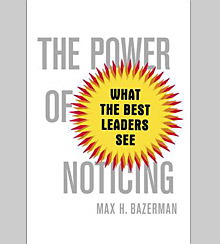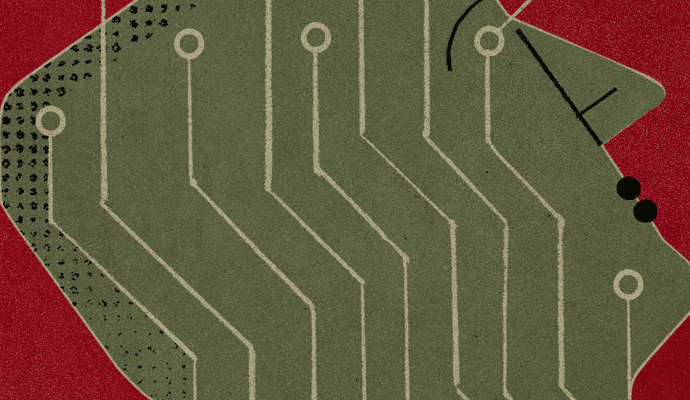Trust me, trust me not
Barry Nalebuff, coauthor of Co-opetition, introduces a passage on when to—and when not to—believe what others say, from The Power of Noticing, by Max Bazerman.
The excerpt below got me thinking about how and why people lie. Falsehoods can come in many forms: There are lies of omission, lies that protect, efficient lies, and, of course, bald-faced lies.
Why do we believe such lies? One reason is their scale. Think about the falsified returns that Bernie Madoff reported for many years—they were good enough to make investing with him look like a sweet deal, but not so good as to be unbelievable. We also tend to believe liars who reveal their incentive to lie up front. My colleague at the Yale School of Management, Daylian Cain, discovered that when a seller reveals a conflict of interest, the buyer trusts the seller more for the disclosure. So far, so good. But now the seller feels much freer to take advantage of the buyer. In other words, people start trusting just when they shouldn’t!
Yet another reason we believe lies is the perceived credibility of their source. For instance, this excerpt reveals that people trust computers more than they should. Of course, computers can be programmed to lie, too. Call me cynical, but if a computer-generated email from Russia asks me for my bank password, I’m not going to give it up.
Trust is at the center of all commerce. But as Bazerman ably explains below, trust need not be a knee-jerk reaction. It can be a thoughtful decision that is based on both what is being said in an exchange and what is going on behind the scenes.
—Barry Nalebuff
An excerpt from chapter 9 of The Power of Noticing:
What the Best Leaders See
In life, there are times when we do think one step ahead, and we do so with a cynical attitude—but the danger is that we can be too cynical. Negotiators frequently need to choose between trusting the other party [and] being cynical of her motives. Too much trust, and you’re a sucker. Too much mistrust, and you could miss an opportunity or fail to develop an important professional relationship. I am probably too cynical in life… [and] I am sure that I have missed out on many valuable opportunities as a result of my cynicism.
Experimental research suggests that I am not alone. Consider the “hidden card game” between a seller and a buyer, which I adapted from the work of Ariel Rubinstein with my colleagues Eyal Ert and Stephanie Creary:
A deck of 100 cards includes all values between $1 and $100, in dollar increments. The seller starts by randomly drawing two cards from the deck. After being told the value of the lower of the two cards, the buyer must decide whether to buy the two cards from the seller at a fixed cost of $100. The cards’ value to the buyer is the sum of the two cards. The seller is rewarded a fixed amount ($10) if the buyer buys the cards. Thus the seller’s interest is to sell the cards regardless of their value. The buyer, on the other hand, wants to buy the cards only when they are valuable (when the sum of cards exceeds $100).
If you are going to play multiple rounds of this game and your goal is to maximize your average payoff (a concept known as “expected value maximization”), you should buy the cards whenever the value of the lower card exceeds $33. Can you see why? At $34, all values for the other card fall between $35 and $100 and are equally likely. This makes the sum of the two cards anywhere between $69 and $134, for an expected value of $101.50, again, all values being equally likely.
Our research examined how buyers react when they see that the lower card is $40, making all values for the combination of the two cards between $81 and $140 equally likely, which implies an expected value of $110.50. To start with, imagine that the seller is an automated computer that is negotiating with the potential buyer with no opportunity for communication. As the buyer, all you know is that the lower of the two cards is worth $40. Given the arithmetic presented above, if you are risk neutral, you will make the purchase. Now reconsider the problem when the seller is another human being and the two parties have the opportunity to interact via e-mail. As the buyer, do you like having the opportunity to talk to a live seller before deciding whether to buy, or do you prefer getting no additional information from a computer? Most people prefer to interact with the human seller. You might want to reconsider the value of this interpersonal information, however.
In our study, when we switch from a computerized seller to a live seller, the acceptance rate of the buyer dropped significantly. Among buyers in the computer-seller condition, 78 percent made the expected-value maximizing decision to purchase the two cards. Meanwhile, less than half (45 percent) made the decision to buy from the human seller. The communication between sellers and buyers made the potential buyers cynical about sellers’ claims, such that they assumed the worst about the value of the hidden card. In their email discussion, buyers’ messages included comments such as “I think you’re lying,” and “Yeah, right, why should I believe you?” Overall, buyers’ cynicism worked against them. The buyers would have been better off acting as if they were dealing with a computer, doing the arithmetic, and accepting the uncertain outcome of always accepting the cards when the lower card was equal to $40.
Ironically sellers believed that communicating with buyers would help them close the deal. They were wrong: cynicism turned out to be the main result of their communication with buyers.
So should you be trusting or cynical? Many would answer on one side or the other. But my view is that either answer would be wrong. My answer is “It depends,” specifically on what can be learned by thinking one step ahead. Thinking one step ahead allows you to identify when to be trusting and when to be cynical. It is wise to think carefully about the decisions and motives of the other party so that you can understand what a problem looks like from his or her perspective. Thinking ahead may help you identify when reasons to trust exist and when you have justification to be cynical. While it doesn’t make sense to be cynical simply because you are dealing with a person rather than a machine, we should not necessarily trust all individuals in all contexts. In some situations it is fairly costless to collect additional information to test our intuition, but we often fail to do so. Your goal should be to understand the strategic behavior of others without destroying opportunities for trust building.
“Thinking one step ahead allows you to identify when to be trusting and when to be cynical.”
—Max H. Bazerman
Copyright © 2014 by Max Bazerman. Reprinted with permission of Simon & Schuster Inc. All rights reserved.




